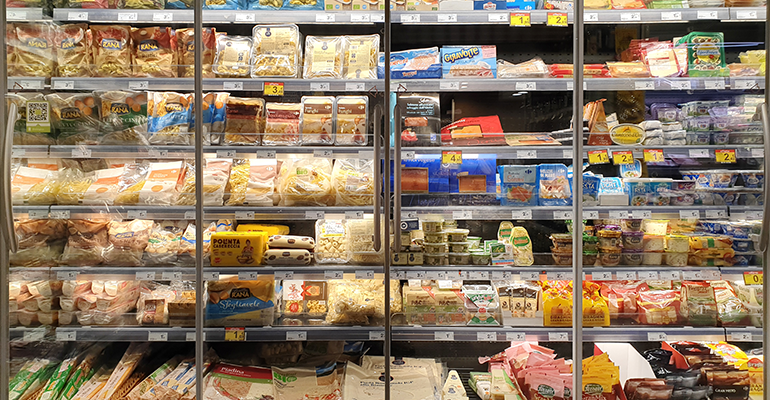News
What do consumers really think of ultra-processed foods?
14 Jul 2023
Most UK consumers are unable to accurately identify ultra-processed foods, believing them to be less processed than they actually are. Many are “shocked” and “worried” when they find out the truth – before rationalising their choices, according to a new survey.
Developed by Brazilian researchers, the NOVA system classifies food by the degree of its processing. The categories range from unprocessed or minimally processed products (such as dried pulses, flour); processed culinary ingredients that tend to be used in small quantities (like cooking oil, vinegar, sugar); to processed (e.g., salted meat, cheese); to ultra-processed.

Ultra-processed products include soft drinks, confectionery, packaged breads, reconstituted meat such as hot dogs, instant soups, and industrially pre-prepared ready meals – and they make up an increasingly significant part of a typical western diet. Fifty-one percent of the average UK diet is made up of ultra-processed products, according to one peer-reviewed study.
The NOVA system has slowly gained traction with policymakers around the world and is increasingly featured across consumer-facing media – but much confusion exists, according to the Institute of Grocery Distribution (IGD). UK-based IGD is a non-profit association whose members include producers, manufacturers, distributers, retailers, trade associations, and government bodies.
It therefore carried out research to determine consumer perceptions of this classification, which it describes as “a new concept [that] has emerged which challenges our understanding of a healthy diet”.
IGD conducted four face-to-face focus groups with people from a range of socio-economic backgrounds and life-stages in London and Leeds, UK, and surveying a nationally representative sample of 997 adults, publishing the results in a report, entitled Ultra-processed foods: a consumer perspective.
Lack of understanding
It found that processing was not front of mind when consumers are making food choices, with less than one in 10 respondents (9%) saying the “amount of processing” was important when shopping, compared to price (70%), taste (58%) and quality (also 58%). However, nearly one in three (27%) said they used processing to determine whether a food or drink is healthy.
Nevertheless, while two in five consumers claimed to understand the term ultra-processed, this understanding was at odds with the official NOVA classification, IGD noted, and many were unable to accurately identify most ultra-processed foods.
The researchers showed consumers pictures of real food and drink products and asked them to classify them as either unprocessed or minimally processed; processed culinary ingredient; processed; and ultra-processed.
Out of nine total ultra-processed products – including packaged biscuits, margarine, packaged pizza, packaged bread, soda, and a plant-based drinking milk – consumers classified only the can of soda as ultra-processed. This means that many consumers underestimate the amount of ultra-processed foods they eat.
Consumer reactions: After the shock comes questioning and rationalising
Learning about which foods are ultra-processed evoked strong emotions and was confusing for consumers, IGD noted. When shown the correct NOVA classification, one 55-year-old woman said: “I used to be stressed about how processed bacon is, now do we have to be worried about bread too?" while a 43-year-old woman said: “It’s shocking, it’s so shocking.”
However, IGD noted three separate stages of reaction when people find out which products are ultra-processed. Consumers were initially surprised and distressed – parents were more likely to feel guilty – however many subsequently questioned its validity as it contradicted their current metric to assess the ‘healthiness’ of food. Many then tried to rationalise the information in the context of their own lifestyles.
“We are expected to use fresh and cook from scratch, but when you’re working when do you have time? No one realistically has time for that,” said one 35-year-old woman. “What are we meant to do?”
Consumers see value in an ultra-processed label
The overwhelming majority (82%) of consumers said they like the idea of a label on foods classified as ultra-processed. However, IGD warned that the usefulness of such a label would need to be considered in a real-life context.
“There is a risk that a label for ultra-processed foods could create greater confusion, particularly in the case of products which fall into the ultra-processed category but are also considered healthy using existing nutrition labelling,” reads the report.
“Therefore, without a better understanding of the trade-offs consumers would make, it is not clear that a label would support a shift to healthier and more sustainable diets.”
Recommendations
Based on the findings of the research, IGD made a number of recommendations. It called on food industry stakeholders to continue to monitor the evidence on the role of food processing and its impact on health, and to consider carefully how healthy eating guidance are communicated to consumers, recognising their challenges in understanding the ultra-processed concept alongside dietary guidelines and the risk of causing greater confusion.
